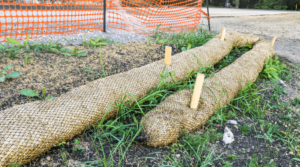
Farm Dictionary 4.jpg
Nitrogen Cycle
Definition: nitrogen cycle
nitrogen cycle: the set of processes by which nitrogen is converted from a gas in the atmosphere to nitrogen-containing substances in soil and living organisms, then converted back to a gas. Nitrogen is absorbed into green plants in the form of nitrates, the plants are then eaten by animals, and the nitrates are returned to the ecosystem through animals’ excreta or when an animal or a plant dies. The nitrogen cycle is fundamental to maintaining soil fertility and supporting plant growth. Farmers can benefit from understanding and managing the nitrogen cycle on their farms. Practices like crop rotation, cover cropping, and the use of legumes can enhance nitrogen fixation and improve soil health. By optimizing the nitrogen cycle, farmers can reduce the need for synthetic fertilizers, lower input costs, and promote sustainable farming practices.
Originally posted 2006-07-06 08:51:25.
Fall off the barn roof and busted your keister? Life on the farm or ranch can be tough on the bum. Need a break? Laugh it off at FarmerCowboy.com, the #1 farm humor site. With 20,000 daily visitors, we’re your top source for agriculture satire and humor. Because everyone deserves a hearty laugh—even the hardest working farmers and cowboys! Join us and turn those long days into fun tales at FarmerCowboy.com.
Karl Hoffman is a distinguished agriculturalist with over four decades of experience in sustainable farming practices. He holds a Ph.D. in Agronomy from Cornell University and has made significant contributions as a professor at Iowa State University. Hoffman’s groundbreaking research on integrated pest management and soil health has revolutionized modern agriculture. As a respected farm journalist, his column “Field Notes with Karl Hoffman” and his blog “The Modern Farmer” provide insightful, practical advice to a global audience. Hoffman’s work with the USDA and the United Nations FAO has enhanced food security worldwide. His awards include the USDA’s Distinguished Service Award and the World Food Prize, reflecting his profound impact on agriculture and sustainability.






